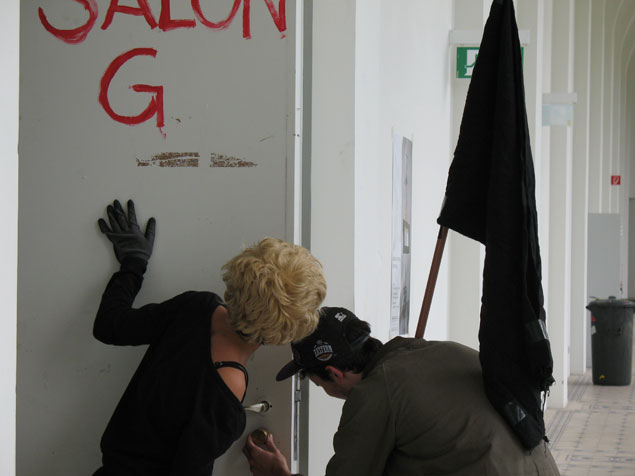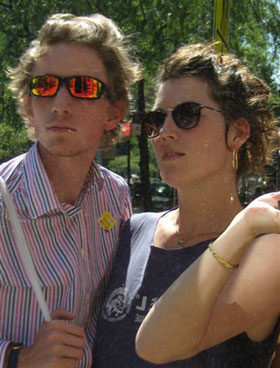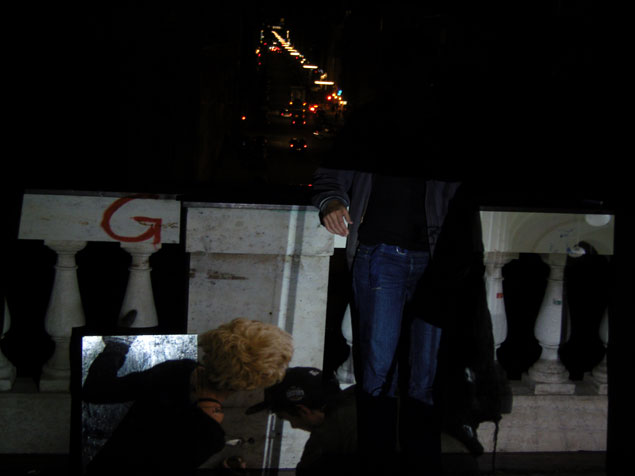The Self, the Group and the Pimp : Two Sides of an Institution
A monologue, analyses and diary extracts by Salong, a self-organized space born during the occupation of the Academy of Fine Arts in Munich during the fall of 2009:

S: The unrest is over, the occupations have been lifted and the neoliberal march around Bologna carries on its elliptic course: the current elites ahead, the future ones goose-stepping behind and then the camp followers of the eternally dissatisfied worriers of the status quo.
a: That sounds pretty paranoid. We’re not doing so badly, are we? Basically we can do what we want. Fuck the Academy, fuck all morals, including yours.
l: Why don’t you come down! We’ve got to stick together, trust each other. That’s our only chance, we haven’t got another one. You won’t make it alone. Neither as an artist, nor as unemployed, nor as a civil servant…
o: Has anybody got a cigarette?
n: Nope.
g: I’d like to kiss you…
Under the neoliberal patriarchate…
Already hundreds of years before the excellence initiatives and the rivalry among the elite universities, the academies used to bank on severer selection criteria and representative relations with patrons and political forces. Today the art schools tend to define themselves as bastions against the wave of rationalization and assessment in the European space of higher education, taking within the Bologna Process a personal and specific stance that is justified by the freedom of art. In this context, the attachment to traditional structures plays an important role; the idea of the master class, the idea of the artist as a genius, the idea of the sublime, the consciousness of belonging to the cultural elite and producing it.
This corporatist and protectionist stance towards the old manages partly to assuage some flaws of the neoliberal reform, partly to put them on hold for a certain period of time. It guarantees several privileges granted to the art student after he has succeeded in entering the illustrious circle of the Academy: relatively low tuition fees, a more balanced relation between students and teachers as well as other collaborators. With its flexible orientation towards the actual political, social and economic needs the school administration is able to maintain the representative function of the Academy of Fine Arts as a place of apparent free thought and action. A place where neoliberal ideology and patriarchal patronage intertwine symbiotically.
The unlikeliness of succeeding in the viciously competitive art market, the permanent precariousness with its threat of downfall, in short: the fear of failure drives a majority into isolation and self-exploitation—into being part of the market. The promised salvation of success through creativity and self-realization is matched with anticipatory obedience. The consequences are: lack of self-assurance, depression, envy and pimples. Only the authoritarian structure proper to the system of the master classes seems to give hold here. It’s the professor who commands in matters of taste, attitude, who is to say what, when and how much, to which theory one has to be subservient and to which gender role. The codes of unspoken though clearly defined rules are also imitated, trained, enlarged and refined among the students, one exercises for the case of emergency. Hierarchies are appearing. That is what one needs to work on and to work out: one has to get rid of the almighty father figure by totally incarnating it, by achieving mastership oneself. The need of self-realization and the Oedipus complex are shaking hands.
If formerly this intertwining represented the model for the functioning of postindustrial societies including their concepts of immaterial work via human capital, today, on the contrary, it presents itself as their parody. The art school is not the impregnable land of plenty. As long as it keeps ignoring the fact that art is not a place apart from social and political processes, it will remain the reproduction machine of the dominating ideology that it is today. By questioning its own presuppositions, the freedom of art, as long as this notion is not misused by the dominating discourses, has a potential of resistance.
Our experiences during the protests show that such a critique bounces off the hard walls of the art schools or is appeased by absurd reforms of the institutionalized normality. Thus, the question is…
S: What are we doing here precisely…
a: Contrary to Œdipal, submissive groups, we, as a subject group, define ourselves by the transversality coefficient that revolts against all totalities and hierarchies: we are the agents of meaning, the carriers of desire, the elements of institutional creation; our practice confronts us constantly with the limits of our own absurdity, of our own death and failure.
l: Where did you get that saying from? I’ve got to remember it.
o: A nice metaphor. But according to me the Œdipal and the subject group are not two different kinds of group, they are two sides of the institution, since the subject group is constantly in danger of letting itself be subjected by paranoid imbrications, by its will to remain subject and to refuse itself at whatever cost.
n: If I get it right, we’re dealing once more with the question of the Outside: outside of the old story of valorization set towards a rationality of end, outside of the imperative of self-realization. How can we produce and maintain that? How can we learn to think, to live and to act in a radical different way? To strike against ourselves?
g: I just happen to remember a poem that I heard recently:
dear economy
ever more people offer themselves to you
hoping to gain fear, to lose
you say there is no outside, no outside to this world,
the one world
but you are not the whole world
space is still the place
We promised it to us and to the others. Fundamentally, what we were saying was nothing else but:
Flyer: “The Academy is something that must be occupied.” The moment was rather due to chance, a demonstration had already been called by students of another Munich university that day in solidarity with those who had occupied in Vienna. That the demonstration took place in front of the Academy was probably due to the fact that people generally believe that the Academy is per se a place of critique, movement and freedom. Our desire for movement was born from the opposite experience.
Anyway. People met there, speeches were held, flags and banners unfolded: it was all about tuition fees, overcrowded auditoriums, headache, commercialization of the void, tinnitus, pressure to be successful, precariousness, arsehole teachers, peer students trying to emulate them, depression and confinement, isolation and apathy—a parody of critique borrowing its forms from a past that none of us has known, a spontaneous reaction to a system that presents itself as a parody.
At some point (one already had the feeling that the slight excitement that was buzzing in the air was about to peter out) people were climbing up the majestic stairs between two iron equine statues, towards the hall, completely refurbished and revamped, all cracks covered up, then in the corridor to the right between high and white walls that have been there to impress for the last two hundred years, then again to the right wing of the building to the Senate Hall. Hubbub in the background, hectic, people shouting slogans, an improvised banner unfolded between two windows shows the University to be occupied.
Now the excitement was not a muffled one anymore. Part of a bushfire that was spreading all over Europe to the usa, the Munich Art School was now also occupied: Vienna, Graz, Linz, Salzburg, Innsbruck, Heidelberg, Potsdam, Darmstadt, Mainz, Berlin, Frankfurt, Halle, Rostock, Cologne, Dortmund, Hamburg, Westminster, Basel, Bern, Berkeley, N.Y., Paris, Belgrade and so forth.
S: To give up the idea of this Outside would mean to give up everything. To work on oneself means…
a: OK, wait a minute, that kind of discourse is being held for ages now and we still read texts written by elder people who are trying to work on that. They too are mostly rhetorical…
l: We’re aware of that, but nevertheless we need that kind of analysis which, basically, we are undertaking at present and that, of course, has been made by lots of other people in other situations.
o: But the spontaneity and the intensity of the lived experience is as important as the analysis, a thing that we have felt during the protests. Only this can lead to a transformation of the way of thinking, to the Outside we’ve just been mentioning. And this is something that doesn’t happen by phases but must take place simultaneously, by close intertwining. In order not to degenerate into naïve
activism or bureaucratic political vanity.
n: Putting it more plainly, it’s a matter of…

g: … getting together. To explore together the world and each other, to perceive the world and oneself as being prone to change, to act together, to realize co-constructions, to tear them down, to refuse any world as one given from outside. To become oneself a cybernetic Symbol Machine. The (postindustrial) capitalism that reproduces constantly and almost autonomously the conditions of its own functioning resembles itself a cybernetic Symbol Machine.
The Bologna Process, initiated by the Bertelsmann Foundation, heralds definitely the advent of the “neoliberal bullshit logic” in the domain of education. It is essential for capitalism to enforce that system since it is the place where knowledge is produced, administrated and creamed off. Only knowledge, its monopolization and creaming off under the form of copyright, licenses, patents etc. assures the continuity of capitalism in its contemporary and unbearable guise. The value of commodity is hardly any more based on material factors as, for instance, invested time, work or materials, but on knowing how to commercialize and produce them—the perfect presentation.
The knowledge carries at the same time the potential to abolish this vicious circle. It’s the only commodity that can be distributed for free while augmenting its fertility.
The autonomization of the economy and the deprivation of political power in society that goes hand in hand with it, seem to make impossible such a use of knowledge. The commercialization of the health system, the social system and other lifeworlds have amply proved to us the efficiency of the capitalist system. The bank crash and the financial crisis illustrate this even more sharply. The campaign under the banner of self-realization that currently steamrolls the universities allows the businesses furthermore to cream off the human capital in form of living knowledge.
Last autumn’s protests have thus to be seen not only as a resistance against the Bologna Process but as a protest against the general transformation of society dominated by the rationality of ends and profit.
S: … a transformation that isn’t aimed at self-conservation but at self-dissolution—a war machine.
a: Yes, exactly.
l: So, now we got it…
o: Oh, if it were so easy. That reminds me Œdipus again.
n: Sorry, I’ve got to go… to work.
g: I think we’ve reached a good point to stop anyway.
As to the beauty of what has been experienced: it has inscribed itself into the history of many people not as external consequence by means of grand institutional, political or economical transformations. As to the beauty, we found it in the experience of giving up oneself as depressive singularity even if only for a short period, going down the hill of narcissistic self-contemplation, gaining together a new perspective through other people, walking through the corridors, contemplating joyfully the cracks in the walls, the Wasteland, having found, as allies, our own new game.
Salong: … to really begin with. I think we have described quite well how we would like to handle the world, how we would like to make art, how we would like to handle ourselves, how we would like us to be the Academy. That means: by ourselves. Ivy creeps over the ruins of the Self.
Traduit de l’allemand par Wolfgang Kukulies















